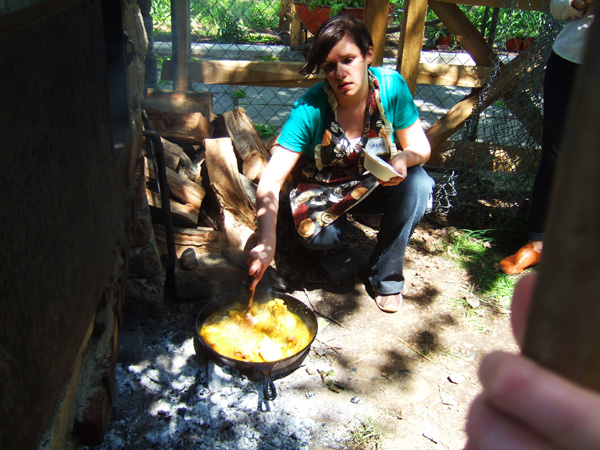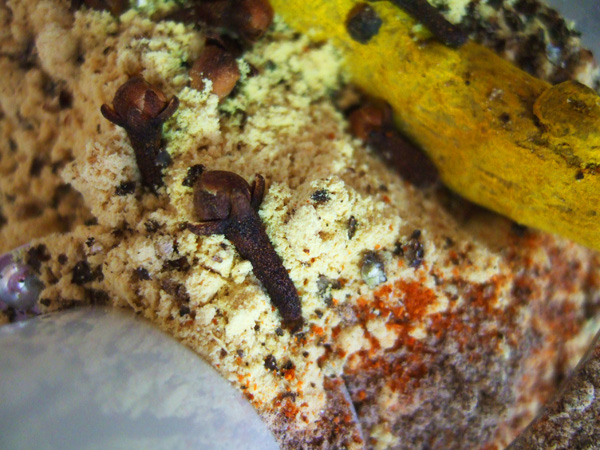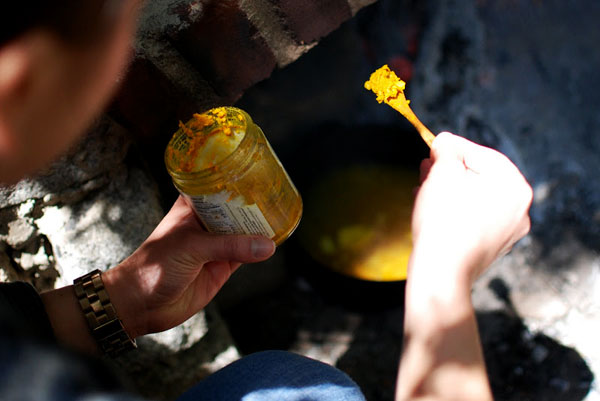 Vigorously stirring curried chicken at my hearth cooking class in Brooklyn. Photo by Edmarie Crespo.
Vigorously stirring curried chicken at my hearth cooking class in Brooklyn. Photo by Edmarie Crespo.
Surprising, isn’t it? Â To see a curry dish from 1840? Â The history of curry in the United States is actually much older than one would expect.
The History
The search for affordable spices pushed the English East India Trading company to establish routes into India as early as the first half of the 18th century.  By 1820, it had used its army to subdue most of India and the government assumed official control of the country by 1858.  It’s not a happy history, but because of India’s colonial government, the flavors many native dishes mixed with English dining habits.
At the same time the British Raj was establishing itself, Americans were busy falling in love with Queen Victoria. Â Although England and America had had their differences in the past, when Victoria ascended to the throne in 1837, we went gaga for the young Queen. Â After marrying her fashionable German husband Albert in 1840, the power couple could do no wrong in our eyes.
Victoria led the trends in the Western World, from Christmas trees to crinolines to curry powder. Â The highly-spiced seasoning blend came from India with returning soldiers; and after gaining popularity in England, became a trend in the United States.
Curry powder, and the use of the word curry, are Western inventions and do not reflect any specific Indian food. Â A similar mixture of spices used in India is called garam masala, but the blend is proprietary and different all over the country.
 The spice blend for an 1840s curry.
The spice blend for an 1840s curry.
The Recipe
I don’t know if this is the earliest curry recipe in an American cookbook, but it’s the earliest one I have found so far. Â The author, Eliza Leslie, directs you to make your own curry powder for this dish.
Chicken Curry
Directions for Cookery, in its Various Branches by Eliza Leslie, 1840
2 chickens, broken down into breasts, thighs, and legs; marinated in a salt water brine at least a half hour.
To make the curry paste:
2 tablespoons powdered ginger
1 tablespoon powdered turmeric
1 teaspoon black pepper
½ teaspoon mace
3 cloves
½ teaspoon cardamom
Pinch Cayenne
Pinch Salt
3 medium onions
Make the curry paste: combine all ingredients in a food processor and blend until it forms a paste. Â Place a quart of water over heat to boil. Â When it comes to a boil, add the curry paste and simmer until dissolved. Â Keep at a boil until you are ready to pour it over the chicken.
Remove chicken from marinade and pat dry.  Heat a generous amount of butter in a pan, then add chicken pieces.  Fry, skin side down, until brown.  Add the curry water, adding more water if necessary to cover the chicken completely.  Simmer until chicken is cooked and tender.  Add two tablespoons of butter kneaded with an equal quantity of flour.  Simmer until the sauce has thickened.  Serve with boiled rice.
 A student in my hearth cooking class adds curry paste to a pot of boiling water. Â Photo by Russell Karmel.
A student in my hearth cooking class adds curry paste to a pot of boiling water. Â Photo by Russell Karmel.
The Results
The curry paste made in this recipe had a floral smell and flavor; and although spicy, not at all hot. Â The turmeric gave it the typical coloring of a curry, but it tasted unlike any curry I had ever had before.
That being said, it seemed to be missing something. Â Although the chicken was pleasant, it lacked the heat of contemporary curry powders which I find makes all of the more subtle spices in the bland marry and sing.
But I’ve also come to suspect that Americans, throughout history, have craved progressively hotter and hotter foods.  At the time of Ms. Leslie’s curry powder, the hottest spice mentioned in popular American cookbooks was black pepper.  In contrast, in the past fifty years chili powder, garlic, and peppers, with greater and greater concentrations of capsaicin, have become more and more common in American food.  I think we have developed a taste for, and a tolerance for, heat.  If Eliza Leslie tasted a modern Indian-American curry, I think her head would explode.

Thanks! Just putting this into your 2012 Diamond Jubilee Time Capsule http://www.dailymail.co.uk/femail/food/article-2048742/Jamies-new-British-classics-Ers-Diamond-Jubilee-chicken.html
So interesting how British interpretations of curry reflect different moments, and as an aside, total appreciation of Jamie Oliver for his generous multi-cultural approach to what Britishness means.
Curries are great historic dishes that are often overlooked–even prior to the 1840s. Mary Randolph mentions curries multiple times in her Virginia Housewife, and even Hannah Glasse’s 18th century The Art of Cookery Made Plain and Easy has a chicken “currey” recipe. Definitely an interesting topic to explore.
Thank you both for the links and the references and the things to think about–I am planning on looking into this topic further, because I do find it fascinating–and you’ve both given me direction on where to go next!!
http://en.wikipedia.org/wiki/Hindoostanee_Coffee_House
First curry joint. No mention of it having red flock wallpaper and serving alcohol after hours.
Paul
Wow, and it predated the first fish and chip shop by 50 years!
Curry is a spice mixture in the same way garam masala is a spice mixture (though the flavors are different). Indian cookbooks I brought back from India use the term — as noun and verb.
Fun! There’s a good chance her chicken may have had more flavor than even our modern free-range birds.
Added this to my food blog today! My Blog is found here: http://peppervanburen.blogspot.com
Added this to my food blog today!